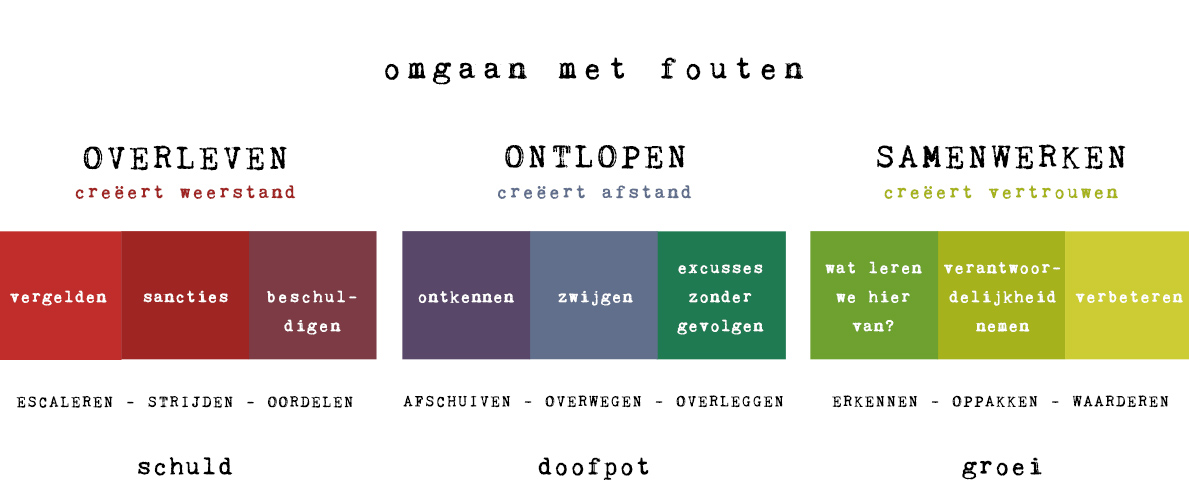How a mistake can lead to blame, cover-up or growth
Everyone makes mistakes...
So how is it that in situations where something goes horribly wrong, still no one admits guilt? How is it that when something goes wrong, everyone looks for one culprit, while knowing that everyone is involved in the mistake and could have done 'something'?
To understand this, we talk about three 'worlds' and also worlds of difference. The atmosphere in the group and the level of trust largely determine whether team members feel the space to admit mistakes. And whether the rest of the team can see mistakes as learning moments FOR THE ALL TEAM. Only then does it become apparent that many could have done 'something'.
Mistakes in a struggling situation
Making mistakes in a pressurised group, where people are struggling with each other, rarely yields learning returns. Why is that? The answer is simple. In a struggling group, acknowledging a mistake means being blamed and 'losing'. Losing your ego, reputation or perhaps your job. No one wants that. Denying and putting the fault on the other person then sometimes seems (in the short term and for yourself) to deliver more: the pressure is shifted to someone else and no extra time needs to be invested in a change.
In teams or situations where people are fighting or in conflict with each other, people sometimes also consciously look for opportunities to blame another. This causes people to be less concerned with doing a good job themselves and more concerned with what the other is or is not doing. With all its consequences for the (business) results!
When the pressure is put on a person, they become more and more defensive and less and less about the content. Mind you, a simple question like "Why did you do it that way?" can already cause a lot of pressure on another person! Feel the difference with 'What could we do about this?'
Making mistakes in an elusive situation
Making mistakes nobody likes to do and nobody likes to be blamed. In a group that avoids each other, blame is not established. The focus is neither on punishment nor on learning from it. The mistake is covered up (with pressure on all involved), tolerated, ignored or dismissed with 'sorry' and everyone goes their own way. In an elusive situation, people are often very busy making sure they don't make mistakes. This means no risks are taken and also little (personal) development takes place. With dire consequences for (business) results!
Making mistakes in a cooperative situation
Is a group close-knit, do team members get the appreciation they deserve AND is there a crisp common goal? Then making and acknowledging mistakes becomes commonplace. 'OK, sorry, I was wrong' then rarely leads to condemnation. On the contrary, reporting a mistake is appreciated because it allows you to learn from it. And learning from mistakes brings you closer to the common goal. The focus is on how this could have happened and how we as a team can learn from the mistake so that it is not made again. It creates more safety, better performance and more connection. A world of difference from a struggling and eluding situation. Even though mistakes are also simply made in cooperative groups, the learning return ensures that more and more goes right. A real growth process. With all its consequences for (business) results!
Errors and politics
In situations where interests (seem to) be opposed, and where multiple teams (parties) play a role, it is all the more important whether mistakes are recognised. Unfortunately, there are plenty of examples where this does not happen, as is now visible in the benefits affair, among others. The series of mistakes is clear, so is the cause. Both Houses of Parliament, several cabinets, the judiciary and journalism were involved. But no one intervened or acknowledged a mistake. The damage then is enormous. In this situation, how do you restart a growth process properly? Ultimately, citizens have a stake in this. And that is a common goal, the national interest, which can then become central again. Only then can we look at solutions and next steps.
It is interesting to realise that as long as a (huge) mistake is denied and covered up, resistance grows. In the case of the allowance affair, the press jumped on it and MPs bit into it. With the 'logical' consequence that culprits are sought. But to what extent is there still room to learn from the mistakes made? And how much attention then goes to resolving the situation?
Dealing with mistakes and learning from them can only be done together. A new president calls for unity. He understands that working together is a prerequisite for dealing with a country's problems. And he also knows that time is needed to process fear and anger and turn them into energy for a new start. Does this require the going president to be declared guilty and punished? If given power, are anger and frustration still an effective tool?
In short:
Any team in which mistakes can be acknowledged and people can and want to learn from them has the potential to be or become a top team.

